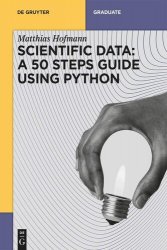Scientific dаta: A 50 Steps Guide using Python
- Добавил: literator
- Дата: 2-10-2024, 13:21
- Комментариев: 0
 Название: Scientific dаta: A 50 Steps Guide using Python
Название: Scientific dаta: A 50 Steps Guide using PythonАвтор: Matthias Hofmann
Издательство: De Gruyter
Год: 2024
Страниц: 234
Язык: английский
Формат: pdf (true), epub
Размер: 32.7 MB
"Scientific dаta: A 50 Steps Guide using Python" is your guide towards experimental scientific data. It aims to bridge the gap between classical natural sciences as taught in universities and the ever-growing need for technological/digital capabilities, particularly in industrial research. Topics covered include instructions for setting up a workspace, guidelines for structuring data, examples for interfacing with results files and suggestions for drawing scientific conclusions therefrom. Additionally, concepts for designing experiments and visualizing the corresponding results are highlighted next to ways of extracting meaningful characteristics and leveraging those in terms of multi-objective optimizations.
The concise problem-solution-discussion structure used throughout supported by Python code snippets emphasizes the work's focus on practitioners. This guide will provide you with a solid understanding of how to process and understand experimental data within a natural scientific context while ensuring sustainable use of your findings and processing as seen through a programmer's eyes.
Audience:
The book is addressed to graduate students of the natural sciences willing to improve their data handling skills and capabilities for long term accessibility of their experimental results. Another potential audience for the book are university professors who want to ensure a sustainable long-term use of experimentally collected data over several “generations” of students. An additional possible target audience could be small or medium-sized companies in the described field that are unable or unwilling to employ a full-time developer to handle advanced database environments and scientific staff with a strong background in data management. In this sense, the goal of the book is to promote a mutual understanding of the needs of both scientists and data engineers.
The greatest value of this book is probably inherent for (self-considered) science dataists. Although I could not find a strict definition of this term, it refers to my understanding of a (trained) R&D scientist using data science tools as an “add-on” to improve the speed and quality of his or her natural scientific work.
Скачать Scientific dаta: A 50 Steps Guide using Python
[related-news] [/related-news]
Внимание
Уважаемый посетитель, Вы зашли на сайт как незарегистрированный пользователь.
Мы рекомендуем Вам зарегистрироваться либо войти на сайт под своим именем.
Уважаемый посетитель, Вы зашли на сайт как незарегистрированный пользователь.
Мы рекомендуем Вам зарегистрироваться либо войти на сайт под своим именем.
